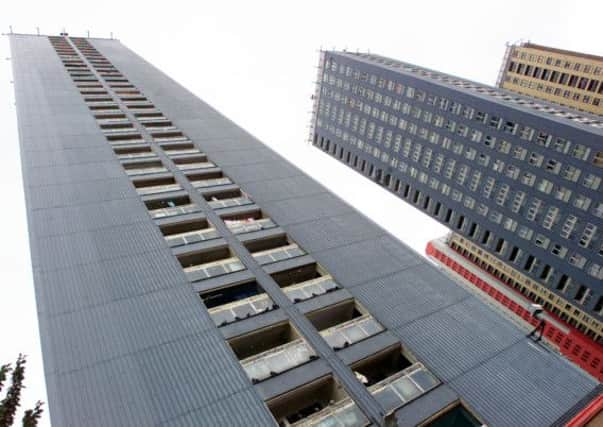Leaders: Glasgow 2014 Games deserve support


It means at the very least that the hundred days to the start of the Games are not marred by an unseemly public row that would have come to be a distraction from the Games themselves.
The proposal to demolish five of the blocks as a visual spectacle for the opening ceremony – to have been shown live on a massive screen at Celtic Park and to a huge TV audience – lacked for nothing in imagination or purpose. The aim was to firmly affix the hosting of the Games to the wider mission of inner city regeneration and improvement in the social conditions of many in the East End of Glasgow.
Advertisement
Hide AdAdvertisement
Hide AdThis aim cannot but be applauded. However, the showcasing of this demolition to millions watching the opening ceremony worldwide was questionable on two counts. First, it was liable to confusion and misunderstanding. Many in that global audience would have struggled to understand why they were watching such a spectacle and the relevance of the demolition to the opening of an international athletics competition.
Second, and closer to home, it offended many former residents of the flats who could not but see a live broadcast of their destruction as a judgment on their own lifestyles and of housing that, for all its shortcomings now, had been a vast improvement on what went before and which marked a substantial improvement in their way of life. It was also seen as a cavalier judgment on those asylum seekers who continue to live in the remaining flats. Within a short period of time, opposition to the controversial proposal was soon vocal and organised, and an online petition against the demolition quickly gathered more than 17,000 signatures. This figure was almost certain to rise as more public figures came forward to voice their concerns. The core issue at heart was whether this was an appropriate way to mark the opening of the Games.
Yesterday the organisers said that opinions about “safety and security” meant the destruction of the flats would not now feature in the opening. This, however, only begged more questions – first as to why there had not been more extensive consultation with former residents themselves; and why “safety and security” considerations only arose after opposition to the proposals began to arise.
However, there will be considerable relief, and not just among former tenants, that the proposal has been abandoned. An appropriate and altogether more common sense way will be found to mark the opening of this iconic international sporting event.
The Games should unite all of Scotland, we must all get behind them, and this was divisive. So right decision, now let’s get on with the Games.
West must be set to respond to Russia
While Russia seeks to minimise its involvement in the latest troubling incidents in eastern Ukraine, it is hard not to detect signs of clear and organised interference. And with Ukraine’s president threatening to launch a “full-scale operation” involving the army, the West now has an urgent requirement to come up with a more convincing strategy to respond to this crisis than it has done to date.
The latest events have brought forth a clear warning from Nato Secretary General Anders Fogh Rasmussen. Many of the units involved in the initial takeover of buildings in several cities in eastern Ukraine look like organised, professional military forces – ominously similar to the intervention seen at the start of Russia’s operation to seize Crimea. And the US ambassador to the UN said the attacks on police and other buildings in eastern Ukraine had “telltale signs of Moscow’s involvement”. Witnesses say the latest developments look neither spontaneous nor unplanned. Should Ukrainian forces respond in the manner indicated by the country’s president, events would take a deeply worrying turn.
The response of the West so far has been divided, confusing and weak. All the talk of targeted sanctions appears to have little effect on moderating Russia’s behaviour. The concern now is that Vladimir Putin may feel he can undertake further advances in Ukraine to support pockets of would-be Russians with relative impunity. Talks are due to get under way this week. Western nations need to have a convincing set of responses in place if this crisis is not to boil over into prolonged and potentially severe military clashes along the Russian Ukrainian border.